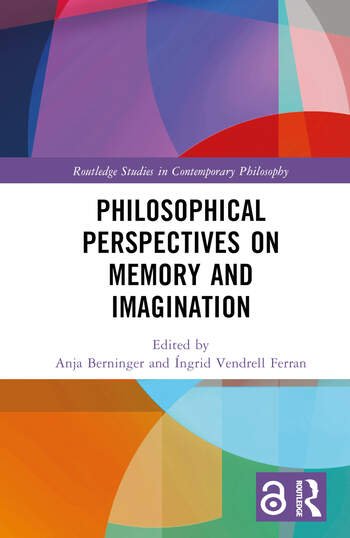This week at The Junkyard we’re hosting a symposium on Anja Berninger and Íngrid Vendrell Ferran’s (eds.) recent book: Philosophical Perspectives on Memory and Imagination. Today we begin with an introduction from Anja Berninger and Íngrid Vendrell Ferran. Commentaries will follow Tuesday through Friday.
When we, Anja Berninger and Íngrid Vendrell Ferran, met at a conference some years ago and started to share our research projects on memory and imagination respectively, we soon realized that a book combining both fields of research would be a valuable addition to the current research landscape. The idea of an edited volume was born, and we soon began commissioning articles. Our edited volume Philosophical Perspectives on Memory and Imagination (Routledge 2022) was published in November last year. When Amy Kind invited us to organize a symposium on our recently published volume on her blog The Junkyard, we were delighted to be offered the opportunity to present our book to a wider audience.
Anja Berninger is a researcher at the University of Göttingen. Her research focusses on the philosophy of mind with special emphasis on issues concerning empathy, emotions and memory (both in individuals and groups). She is the author of a book on emotions as well as numerous articles published in journals such as Philosophical Psychology, Phenomenology and the Cognitive Sciences, Journal of Applied Philosophy, Journal of Value Inquiry.
Our interest in pursuing this project together was influenced by recent developments in philosophy. After a long period of neglect, memory and imagination have received considerable philosophical attention in the last decade. Most of the interest in these areas has come from the philosophy of mind, but other fields such as aesthetics and ethics have also been involved. At the beginning of this renewed interest, the two states were considered as separate, unrelated entities. Most people working in the field thus were interested in either better understanding memory or better understanding imagination. For a long time, only a small handful of scholars worked on both states. More recently, the landscape has again changed considerably. Philosophers are now much more interested in discussing the (potential) connections between the two states. In part, this has to do with some scholars questioning whether there is a firm boundary to be drawn between episodic memory on the one hand and imagination on the other. Thus, some philosophers now support some version of the claim that the two states may lie on a continuum. The debate about (dis-)continuism has resulted in an increasing number of philosophers of memory becoming interested in imagination and vice versa.
Íngrid Vendrell Ferran is Professor of Philosophy at the University of Marburg. Her research is in the areas of philosophy of mind, epistemology, and aesthetics. She is the author of two books, Die Emotionen. Gefühle in der realistischen Phänomenologie (2008) and Die Vielfalt der Erkenntnis (2018). Her academic articles have been published in Review of Philosophy and Psychology, Ethical Theory and Moral Practice, Journal of Aesthetics and Art Criticism, Topoi, and Human Studies, among others.
In putting together this volume we had three main objectives. To begin, one central aim was to bring together key contributors to the (dis-)continuism debate and to move it forward. However, despite its significance, we did not want the volume to focus exclusively on this discussion. Rather, our idea was to broaden the debate further, by also including contributions that consider the nature of both states as well as their relation to other mental states such as the emotions. Second, we wanted to include philosophers from a relatively wide range of backgrounds. We felt that in order to enrich the current debate it was necessary for the volume to include perspectives from different philosophical traditions. Many of the contributions of the edited book rely on empirical data to some extent at least, while others focus more on conceptual analysis. Most of the chapters are by scholars working in the analytic tradition (broadly understood) but some are also inspired by phenomenology and draw on ideas which can already be found in classical phenomenology. Finally, we have sought to edit a volume in which no single contribution focuses exclusively on memory or imagination. Rather, although the degree of engagement varies of course according to the topic chosen, all the contributions have something to say about both memory and imagination.
After receiving the commissioned papers, we structured the volume into four main parts. The first part is entitled “Memory and Imagination: Ontological Issues” and includes contributions by Peter Langland-Hassan, Christopher McCarroll, Alma Barner, Kourken Michaelian and Paul Noordhof. The chapters written by these authors address two main issues. On the one hand, some of the contributions are concerned with the (dis-)continuism debate about memory and imagination either at the individual or at the collective level. They focus on understanding what sorts of structural differences exist (or do not exist) between these two states exist and how these should be cashed out in terms of understanding the relationship between the two. On the other hand, some of the papers address specific issues regarding the structure of memory and imagination as states. One central question discussed is how we should describe the relation in which memory stands to its objects. Does it involve some direct awareness of the object or is the relation indirect in some sense?
Many of the papers in this section discuss the differentiation between memory and imagination through the lens of other concepts and distinctions that have thus far only played a relatively minor role in the debate. Thus, the concepts of forgetting, judgement, and directions of fit are all used in this way to further the debate.
The second part of the volume entitled “Memory, Imagination, Justification and Perspective” focuses on epistemological questions (most importantly, epistemic generativity) as well as issues connected to the role perspective plays for memory and imagination. These issues are explored in chapters by Kengo Miyazono and Uku Tooming, Margherita Arcangeli, and Anco Peeters, Erica Cosentino, and Markus Werning. One central starting point for all these authors is a frequently cited observation about the role that perspective plays in episodic memory. Thus, scenes that we have (visually) experienced from a field perspective can end up being (episodically) remembered from an observer perspective. This raises a number of different questions, which are explored throughout this section of the volume: What exactly is the perspective from which we imagine or remember something? Is this a purely visual affair or should other aspects (such as emotional and social aspects) also be included in the description of what is meant by “perspective” here? Does imagining something always involve taking a full-fledged point of view from which we experience it? And what are the epistemological implications of the possibility of shifts in perspective between our original experience and the memory of that experience?
The papers in the third part of the volume entitled “Memory, Imagination, Skills, and Abilities” discuss issues regarding memory and imagination as skills, abilities or powers. This part includes chapters by Amy Kind, Robert Hopkins, and Sarah Robins. In the contributions provided by these authors, the comparison between memory and imagination is employed to examine their nature in terms of skills and abilities. As Hopkins highlights right at the beginning of his contribution, conceiving of memory and imagination as powers involves a fundamental shift in perspective from most current philosophical reflections on these mental phenomena. Thus, many authors focus on the occurrent aspects of the phenomena (such as a memory of some past event occurring to a subject at a specific point in time). In talking of skills and powers, we move away from the occurrent perspective and take the non-occurrent aspects of memory and imagination into view.
This perspective allows us to also discuss forms of training as a way of improving both memory and imagination. It can thus allow us to integrate debates that have not received much attention in philosophy, although they have been of interest outside philosophy. Given these differences, it is not surprising that both Kind and Robins pick up on discussions from outside the subject. Kind looks at ways in which memory and imagination are improved, paying particular attention to training in professional sports. Robins also looks at training but focuses on a different case, namely the construction of memory palaces.
The last part entitled “Memory, Imagination, and Emotion” explores the relation between these three mental states. The integration of discussions on memory into the debate is something that is of importance to both of us (as editors) since we have both been working in the philosophy of emotion for quite some time. The contributors of this last part of the book are Íngrid Vendrell Ferran, Anja Berninger, and Fabrice Teroni. Two sets of questions lie at the heart of this section: first, the question of how we might be able to imagine emotional states and in how far this will involve drawing on the memories we have of having gone through certain emotional episodes; second, questions on how both memory and imagination might be involved in bringing about other mental phenomena such as our sense of identity and feelings of nostalgia.
We hope that this collection will be of value to researchers working on memory, imagination and issues at the intersection of the two, and that the volume will help to advance the debate in both fields.



